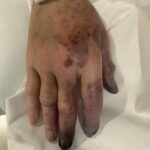In this episode, Dr. Kumar rheuminates on why we procrastinate and how to use this human tendency to our advantage.


In this episode, Dr. Kumar rheuminates on why we procrastinate and how to use this human tendency to our advantage.

Clinicians should not rely on glucocorticoids as a first-line treatment of SARD-ILD in patients with systemic sclerosis, according to a strong recommendation in a new ILD treatment guideline from the ACR and CHEST. The guideline is one of two addressing the screening, monitoring and treatment of patients with interstitial lung disease (ILD) secondary to systemic autoimmune rheumatic diseases (SARDs).

There’s a Word file—somewhere—on one of the many flash drives jumbled in a drawer in my home office. That file is named something like “Overcoming_Procrastination_Column.docx” and was last accessed in the year 2018. I know I wrote about 500 words, and then, one day, I said I would finish it later. But I never did….

Adina Greene, BA, Sabrina Dahak, MD, Wesley A. Robertson, MD, Denege Ward-Wright, MD, & Kristen Young, DO, MEd |
Granulomatosis with polyangiitis (GPA) is a small vessel vasculitis associated with anti-neutrophil cytoplasmic antibodies (C-ANCA), specifically proteinase 3 (PR3) ANCA. GPA classically presents with multi-organ involvement. The first description of GPA defined a triad of features: 1) systemic necrotizing angiitis, 2) necrotizing inflammation of the respiratory tract and 3) necrotizing glomerulonephritis.1 Few cases of digital…

Lucy Masto, BS, Medha Barbhaiya, MD, MPH, Caroline H. Siegel, MD, MS, Lisa R. Sammaritano, MD, & Michael D. Lockshin, MD |
Undifferentiated connective tissue disease (UCTD) is a diagnosis given to patients who do not fulfill current classification criteria for named connective tissue diseases (CTD)—systemic lupus erythematosus (SLE), rheumatoid arthritis (RA), systemic sclerosis (SSc), or Sjögren’s disease—but who nonetheless have clinical signs and symptoms and serological evidence of autoimmune CTDs. In 1980 LeRoy et al. were…
Joseph Cantrell, JD |
Two recent Supreme Court decisions, Trump v. United States and Loper Bright Enterprises v. Raimond, have broad implications for administrative authority and regulatory advocacy. Joseph Cantrell, JD, analyzes how these decisions may affect the relative power of the different branches of government.

Dr. Megan Cooper Appointed Director of Pediatric Rheumatology & Immunology Division at WashU Megan A. Cooper, MD, PhD, a physician-scientist recognized internationally for her work in pediatric immunodeficiencies and immune dysregulation, took the reins of the Division of Pediatric Rheumatology and Immunology at Washington University School of Medicine, St. Louis, as director this past fall….

Philip Seo, MD, MHS |
The large vessel vasculitides were a major focus of the 21st International Vasculitis Workshop held in Barcelona in April. The biennial conference brings together specialists from multiple disciplines, including rheumatology, nephrology and immunology, to discuss cutting-edge vasculitis research. This article reviews important points regarding the pathogenesis, diagnosis and management of both giant cell arteritis and…

Lupus Fog? By Laura C. Plantinga, PhD, Patricia P. Katz, PhD, S. Sam Lim, MD, MPH, C. Barrett Bowling, MD, MSPH, & Jinoos Yazdany, MD, MPH Why was this study done? Perceived cognitive impairment (i.e., lupus fog) is common in systemic lupus erythematosus (SLE). However, comprehensive, multidomain assessments of objective cognitive function are rarely performed….

The FDA’s latest label change for voclosporin adds data demonstrating its safety and efficacy, as well as a sustained renal response, in patients with lupus nephritis through three years of treatment.

The FDA has granted sarilumab its first pediatric indication, approving the agent to treat active, polyarticular juvenile idiopathic arthritis (pJIA) in patients who weigh at least 63 kgs.